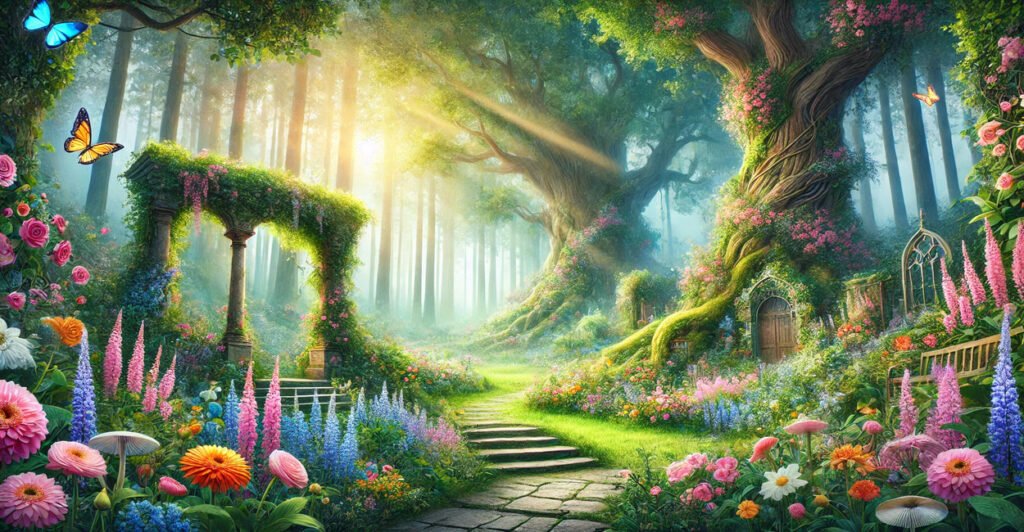Interested in Kids Fairytales?
Interested in Kids Fairytales?

The Secret Garden Musical offers something ageless, mysterious, and very moving. Ranked among the most important fairy tale-inspired presentations in modern theater, this enchanting musical combines themes of grief, healing, and optimism based on the well-known classic novel by Frances Hodgson Burnett. Whether your degree of knowledge with it is long-time fan or someone just finding it for the first time, this guide will take you deep into the core of its story, the magic of its music, and the emotional impact it continues to have on audiences.
At Storyious, where we honor all kinds of narrative—from fairy tales to great adventures—we think that musicals like this one have the soul of ageless fairy stories. And few tales, given to song, blossom as brilliantly as The Secret Garden.
[wpbread]
Published first in 1911, Frances Hodgson Burnett’s book The Secret Garden has captivated readers for more than a century. Set in Edwardian England, it chronicles the neglected and spoilt Mary Lennox, a daughter assigned to live at Misselthwaite Manor following the death of her parents. She discovers there not just a secret garden but also the therapeutic value of nature, friendship, and love.
Rich in symbolism and emotion, this gripping story set the ideal stage for a theater production. Lucy Simon, with a book and lyrics by Marsha Norman, turned the narrative into a Broadway musical in 1991. While adding soaring melodies and lyrical narrative to improve the emotional heart of the book, the musical adaptation remains faithful to it.
While not a traditional fairy tale with magic spells and dragons, The Secret Garden Musical echoes the genre’s themes—transformation, redemption, and discovery. It’s one of those rare stories that blend realism with the fantastical feel of nature’s magic.
The musical follows Mary Lennox as she is uprooted from her life in India and brought to the cold, mysterious Misselthwaite Manor in Yorkshire. She encounters her bereaved uncle Archibald Craven and his ill son Colin there, both emotionally walled away much like the deserted garden behind the estate’s gates.
Mary helps mend the wounded spirits around her while she starts to tend the unkempt garden. Once locked up but now starting to blossom, the secret garden turns into a potent metaphor for the protagonists’ secret inner lives.
Mary Lennox is a stubborn, lonely child who finds her connection and mission.
Mourning widower Archibald Craven has cut himself off from his family.
Once he discovers his health and vigor, Colin Craven, a bedridden lad who feels he is doomed, changes his perspective.
Dickon is a nature-loving Yorkshire lad who first befriends Mary and acts as a link to the garden’s healing ability.
The late wife of Archibald, Lily Crave, haunts the estate and whose love spans death.
These people come alive via songs that convey their inner conflict, longing, and hope as much as by conversation.
The soul of the musical lies in its haunting and hopeful score. The music elevates the storytelling, transforming inner thoughts into beautiful ballads and duets. With every note, we are pulled deeper into the world of Misselthwaite.
Some standout songs include:
“Lily’s Eyes” – A powerful duet between Archibald and his brother Neville as they remember Lily.
“The Girl I Mean to Be” – Mary’s anthem of transformation and self-discovery.
“Come to My Garden” – A lyrical moment where the spirit of Lily reaches out to Colin.
“Wick” – A joyful celebration of growth and life, led by Dickon.
These songs reflect themes central to The Secret Garden Musical—grief, healing, connection, and rebirth. They not only push the plot forward but also give the audience a deeper emotional experience.
The ethereal, almost fairy-tale-like mood created by composer Lucy Simon’s combination of classical inspirations, English folk tunes, and emotive ballads is virtually unlike many Broadway productions; it draws you in with its intimacy and emotional honesty rather than a loud and spectacular presentation.
Critics greeted The Secret Garden Musical with praise when it opened on Broadway. Among three Tony Awards in 1991, it won Best Book of a Musical. Among adaptations of children’s literature, its emotional depth, rich score, and faithful reading of the book distinguished it.
The musical was hailed for providing something unique—gentle, emotionally complicated, and quite affecting. It spoke to viewers of all ages by depending more on sincerity than on spectacle.
Like the beloved classic fairy tales at Storyious, The Secret Garden investigates universal subjects that cut throughout time. Its message, that love and nature can mend even the toughest scars, seems more pertinent now.
Resilience, loss, and empathy are lessons commonly taught to kids in the classroom. Productions at community theaters and educational institutions throughout the United States keep bringing young actors and audiences to this lovely story.
Appreciating the underlying emotional depths of the story, many people find themselves pulled back to it as adults. This is a rare family-friendly musical that allows its audience to feel and develop alongside the characters rather than downgrading them.
Despite lacking traditional fairy tale tropes, The Secret Garden holds all the magic one expects from the genre. In fact, at Storyious, we classify this tale under our Fairy Tales category for that very reason.
The secret garden itself is a hidden world—locked away, forgotten, and nearly lost to time. Much like Narnia behind the wardrobe or the Beast’s enchanted castle, it invites curiosity and adventure. Its “magic” doesn’t come from spells but from growth, love, and time—elements just as powerful as any wizard’s wand.
Mary’s evolution mirrors that of many fairy tale protagonists. She begins selfish and angry but becomes compassionate and courageous. Her journey teaches that real transformation comes from within, and that kindness can break curses far more effectively than any prince.
Over the years, The Secret Garden Musical has seen several revivals, each bringing fresh life to the beloved story. A 2020 Off-Broadway revival introduced a darker, more psychological take on the characters, while still honoring the musical’s emotional heart.
Streaming culture and social media have also helped the musical find new audiences. Clips of performances, covers of songs, and fan tributes have brought this classic back into the spotlight for younger generations.
Even in today’s fast-paced digital world, The Secret Garden remains relevant. Its themes of isolation and reconnection, especially after a global pandemic, speak to audiences who have themselves felt “locked away.” The garden, in many ways, symbolizes the return to life—and that message is evergreen.
At Storyious, we believe that powerful storytelling can be a teaching tool. The Secret Garden Musical is perfect for sparking conversations in classrooms and family settings about grief, growth, and empathy. Teachers often use it to introduce students to musical theatre, classic literature, and themes of mental wellness.
School productions of the musical are not only enriching but also inclusive. The roles allow young performers to explore deep emotions and build their confidence. It also encourages creativity in set design—recreating the garden on stage is a beautiful challenge for student theatre groups.
The Secret Garden Musical is a trip into the core of human change, not just a theatrical translation. Audiences of all ages still find inspiration in its tale, melodies, and emotional depth. Like the garden itself, it softly blooms in the hearts of all who visit it, leaving behind healing, calm, and wonder.
At Storyious, we honor tales like these—fairy tales with truths that stick with us for life, that might not have dragons or wands. Let this song guide you there—one note, one pedal, one narrative at a time—to rediscover the power of transformation, connection, and hope.
Join our community of story writers crafting original fiction across genres. Get published, be read, and make an impact.

Take our 10-minute quiz, with lifelines and swapping options, for a quick and reliable snapshot of your English proficiency.
Lorem ipsum dolor sit amet consectetur adipisicing elit. Quas magni cupiditate aliquauibusdam nostrum accusantium fuga delectus quo exercitationem!
Where Every Story Sparks a New Adventure!
At Storyious, talented writers transform their ideas into captivating narratives that inspire, entertain, and connect readers of all ages. With a deep commitment to creativity and excellence, every story we publish is authentic, human-crafted, and carefully curated to spark imagination and leave a lasting impact.
Stay connected with Storyious! Subscribe now to get the latest stories, featured reads, and exciting updates delivered straight to your inbox, never miss a magical moment.
2025 © Storyious | POWERED BY Storyious
Get ready for something extraordinary! We’re about to launch a powerful new feature that will redefine how you read, experience, and connect with stories. It’s bold, it’s brilliant, and it’s just around the corner
Keep checking back, because the future of storytelling is about to unfold, only on Storyious. Are you ready to be amazed?
Love stories? Join our community of story lovers today and don’t miss a single tale! Subscribe to Storyious and get the latest stories, featured reads, and exclusive content delivered straight to your inbox. Whether you enjoy magical fairytales, moral lessons, or bedtime classics, there’s always something new waiting for you.
You’ve successfully subscribed to our newsletter.
We’re excited to keep you updated with our latest news and offers.
You’ve successfully subscribed to our newsletter.
We’re excited to keep you updated with our latest news and offers.
We’ve received your message! Due to a high volume of inquiries, our team typically takes 3 to 5 working days to respond. We appreciate your patience and look forward to assisting you shortly. Stay connected!
You’ve successfully submitted your story. Our editorial team will review your story to ensure it aligns with our storytelling standards and content guidelines.
If your story meets our criteria, it will be accepted and published within 5 business days. Due to the high volume of submissions we receive, we may not be able to respond individually to stories that do not meet our editorial needs.
If your story is not published within 15 days, it may indicate that it was not selected for publication at this time. Thank you for contributing to Storyious; we truly value your voice and creativity!
Thank you for your interest in advertising with Storyious! Our team has received your request. We will carefully review your submission and get back to you within the next 3 to 5 working days. If you have any urgent queries or want to follow up, please contact us.
We look forward to helping you connect with an enthusiastic, global story-reading community.
Comments